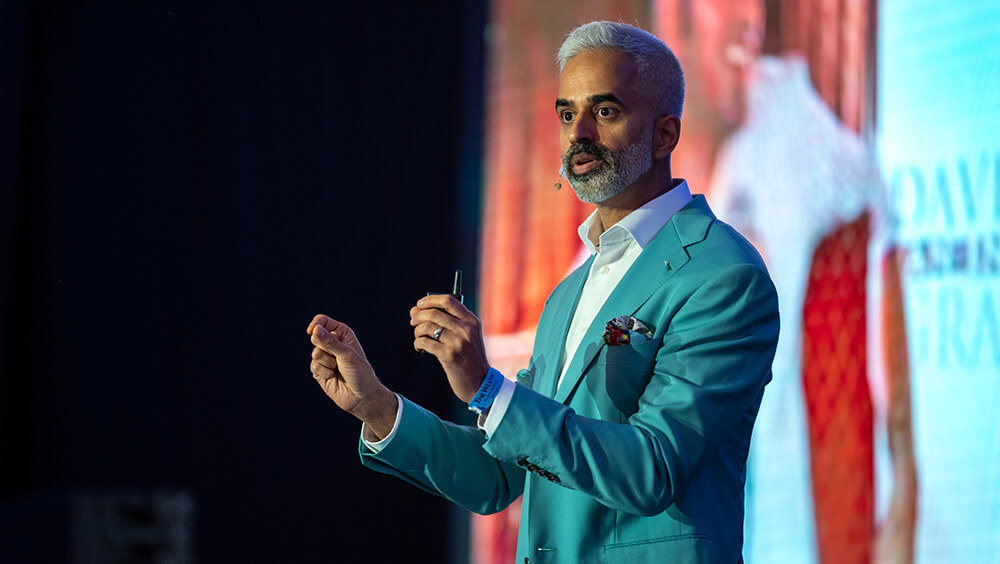
Human connection expert Riaz Meghji speaks at the PCMA Foundation Partnership Summit 2023 in Panama City, Panama. (Marton Ats photo)
Hybrid events may not be top of mind for event planners anymore — according to the results of Convene’s Meetings Market survey, more than two out of five planner respondents have returned to fully in-person meetings — but that doesn’t mean we don’t continue to live in a hybrid world. In the workplace, for example, we continue to experience the challenge of connecting with a dispersed staff.
Enter Riaz Meghji, a human connection expert and author of the book Every Conversation Counts: The 5 Habits of Human Connection That Build Extraordinary Relationships. Meghji delivered the keynote “Establishing Stronger Human Connections” at the PCMA Foundation Partnership Summit 2023, an invitation-only event held Sept. 28–Oct. 1 in Panama City, Panama. Convene asked him to share some of his advice for building meaningful connections with our teams and in the way we design our events via email in advance of his session.
What are effective ways for managers to connect with their team members?
Give your people permission to get personal.
Catalyst’s global study of over 12,000 employees revealed the value of leading with vulnerability. In fact, the study found when managers are vulnerable, employees are more willing to go the extra mile for them. However, only 24 percent said their leader was comfortable being vulnerable. If leaders are willing to “go first” with raw and relevant self-disclosure, their example sets the stage for deeper conversations and connections with their teams.
What’s a common mistake leaders make when trying to build relationships?
Trying to fix someone’s problem before feeling it. If we do this, our intention to serve can become a barrier for connection.
For example, if we have an employee sharing something they are struggling with and we jump in too quickly and give advice before asking questions (and stroke our own ego in the process), we could end up solving the wrong problem or worse yet, micromanaging the conversation where the person is deprived of figuring out their own answers.
Leading with empathetic curiosity to understand why their challenge is important, how it impacts them and what they believe could be the solutions, allows them to be the expert of their own reality and can help build resilient mindsets in times of uncertainty.
You’ve written about the importance of disconnecting to be fully present. Please share.
By intentionally disconnecting, we can connect better with the people around us. Our current digitally connected reality has us more addicted to the dopamine hit of novelty (e.g., swipe right, check notifications, mindless scrolling). This costs us valuable time as one popular study showed that it takes 23 minutes to recover from disruptions like [looking at] your phone at work.
A simple first step? Get better at being bored. This is something I’ve personally been focusing on. Boredom has been found to spark individual productivity and creativity.
We could start by incorporating more daily activities that require minimal concentration such as going for a walk, sitting in silence, or even daydreaming. This can help us recharge our minds and well-being.
Also, work/life balance gets talked about a lot. What if we took it one step further and asked ourselves, “How can I prioritize being as much as I prioritize doing?”
According to a recent Freeman report, millennial and Gen Z attendees are particular about what they want out of in-person meetings. How do you suggest creating engaging sessions that are memorable?
The price of engaging sessions isn’t just effective planning, it’s connection.
For in-person events in our hybrid world of work, I believe keynotes and learning sessions not only need to provide tangible takeaways, but also personalized opportunities for building connection.
RELATED: Can We Become Limitless at Work?
We could plan by focusing on addition by subtraction. For example, speakers could be encouraged to deliver thought-provoking ideas concisely (i.e., 30 minutes), then intentionally provide space for social learning and sharing with their peers. This could happen during the keynote itself with mini breakouts guided by curated prompts, or even by adding a post-keynote workshop where attendees can open up, implement new ideas introduced, and get personal about what’s really going on in their lives.
Allowing attendees to learn, share their own stories/expertise, and then holding space for personal reflections (potentially shared with the entire room), transforms [them] into active contributors to the success of the session, instead of being passive participants.
How can we connect with quiet learners in our online communities who prefer to listen and read instead of share and post and get a sense of their priorities too?
Remind your community you care. Sometimes the real content is in the comments. Obviously, it’s valuable to learn from expertise shared in posts. Reading through the comments to understand what’s on their minds helps reveal community priorities. If the quiet learners aren’t commenting, get proactive by asking survey questions such as:
- What was most useful for you?
- What did you discover that you didn’t already know?
- What would you add or do differently, if anything?
These expansive questions help ignite self-discovery and remind the silent learners that you care about their perspectives and that their input can shape future progress.
Magdalina Atanassova is digital media editor of Convene.
